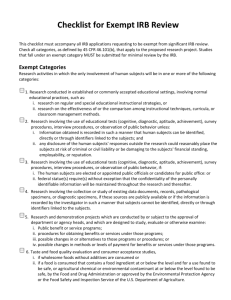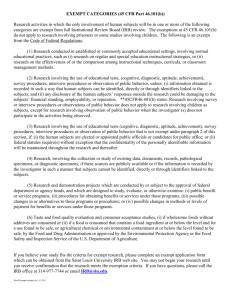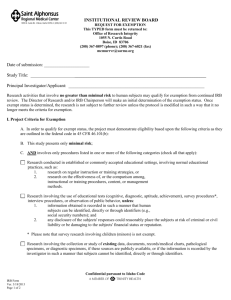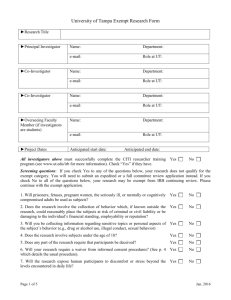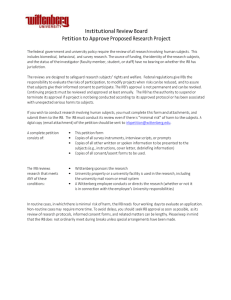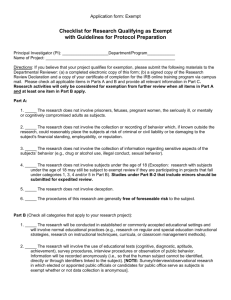screening questions - University of Illinois at Urbana
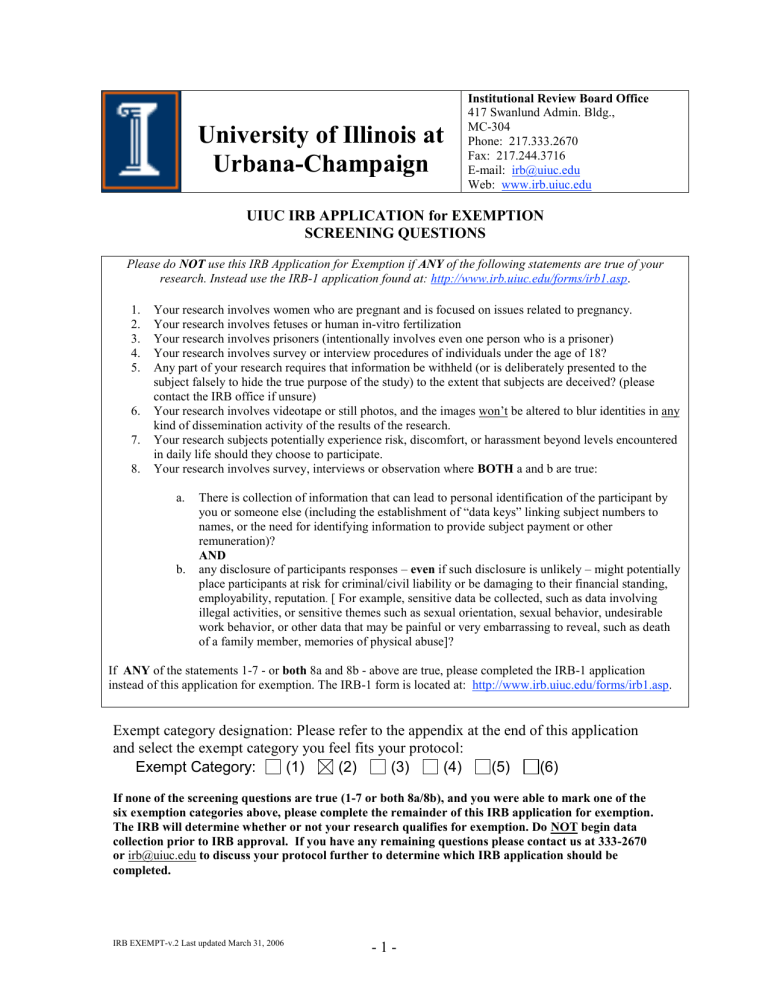
University of Illinois at
Urbana-Champaign
Institutional Review Board Office
417 Swanlund Admin. Bldg.,
MC-304
Phone: 217.333.2670
Fax: 217.244.3716
E-mail: irb@uiuc.edu
Web: www.irb.uiuc.edu
UIUC IRB APPLICATION for EXEMPTION
SCREENING QUESTIONS
Please do NOT use this IRB Application for Exemption if ANY of the following statements are true of your research. Instead use the IRB-1 application found at: http://www.irb.uiuc.edu/forms/irb1.asp
.
1.
Your research involves women who are pregnant and is focused on issues related to pregnancy.
2.
Your research involves fetuses or human in-vitro fertilization
3.
Your research involves prisoners (intentionally involves even one person who is a prisoner)
4.
Your research involves survey or interview procedures of individuals under the age of 18?
5.
Any part of your research requires that information be withheld (or is deliberately presented to the subject falsely to hide the true purpose of the study) to the extent that subjects are deceived? (please contact the IRB office if unsure)
6.
Your research involves videotape or still photos, and the images won’t be altered to blur identities in any kind of dissemination activity of the results of the research.
7.
Your research subjects potentially experience risk, discomfort, or harassment beyond levels encountered in daily life should they choose to participate.
8.
Your research involves survey, interviews or observation where BOTH a and b are true: a.
There is collection of information that can lead to personal identification of the participant by you or someone else (including the establishment of “data keys” linking subject numbers to names, or the need for identifying information to provide subject payment or other remuneration)?
AND b.
any disclosure of participants responses – even if such disclosure is unlikely – might potentially place participants at risk for criminal/civil liability or be damaging to their financial standing, employability, reputation .
[ For example, sensitive data be collected, such as data involving illegal activities, or sensitive themes such as sexual orientation, sexual behavior, undesirable work behavior, or other data that may be painful or very embarrassing to reveal, such as death of a family member, memories of physical abuse]?
If ANY of the statements 1-7 - or both 8a and 8b - above are true, please completed the IRB-1 application instead of this application for exemption. The IRB-1 form is located at: http://www.irb.uiuc.edu/forms/irb1.asp
.
Exempt category designation: Please refer to the appendix at the end of this application and select the exempt category you feel fits your protocol:
Exempt Category: (1) (2) (3) (4) (5) (6)
If none of the screening questions are true (1-7 or both 8a/8b), and you were able to mark one of the six exemption categories above, please complete the remainder of this IRB application for exemption.
The IRB will determine whether or not your research qualifies for exemption. Do NOT begin data collection prior to IRB approval. If you have any remaining questions please contact us at 333-2670 or irb@uiuc.edu
to discuss your protocol further to determine which IRB application should be completed.
IRB EXEMPT-v.2 Last updated March 31, 2006
- 1 -
Request for IRB Exemption
Application for Review of Research Involving Human Subjects
This Section is for Office Use Only
UIUC IRB Protocol No. _______________
Exempt under 45 CFR §46.101(b) (1) (2) (3) (4) (5) (6)
Human Subjects Research Specialist:________
ALL APPLICATIONS MUST BE TYPEWRITTEN, SIGNED, AND SUBMITTED AS SINGLE-
SIDED HARD COPY.
Please, no staples!
Project Title: Web Mash-up Development
1.1
Responsible Project Investigator.
The RPI must be a non-visiting member of UIUC faculty or staff who will serve as project supervisor at UIUC. Students, interns, post-doctoral researchers, and visiting faculty from other campuses may not serve as RPI, but should be listed as investigators, if applicable.
Last Name: Twidale
Dept. or Unit: GSLIS
Street Address: 501 E. Daniel St.
Phone: 217-333-3280
First Name: Michael
Office Address: 101 LISB
City: Champaign
Fax:
Academic Degrees: PhD
Mail Code: 493
Zip Code: 61820
E-mail: twidale@uiuc.edu
UIUC Status (please mark one): Non-visiting member of Faculty Staff
1.2
Investigators.
Please list: All investigators who are different from the RPI, including those from other institutions.
Include all persons who will be directly responsible for the project’s design or implementation, the consent process, data collection, data analysis, or follow-up.
Last Name: Jones
Dept. or Unit: GSLIS
Street Address: 501 E. Daniel St.
Phone: 217-333-3280
UIUC Affiliation (please mark one): Faculty Staff Grad Student
Visiting Scholar Non-UIUC Affiliate of (Institution)
Please check here and attach a list of Additional Investigators, if applicable.
First Name: M Cameron
Office Address:
City: Champaign
Fax:
Academic Degrees: BS
Mail Code: 493
Zip Code: 61820
E-mail: mjones2@uiuc.edu
IRB EXEMPT-v.2 Last updated March 31, 2006
- 2 -
2. Research Summary.
In layman’s language, please summarize the objectives and significance of the research.
The goal of this project is to develop a better understanding of new paradigms of interaction and innovation on the web, commonly referred to as “Web 2.0”. Specifically, this project seeks to understand the phenomenon of web mash-ups, where existing web applications and content are remixed to create new applications. With respect to the legality of web mash-ups, most service and data providers on the web have already moved, or are moving, to support mash-up capabilities in their systems. Thus many of the data and services used in mash-ups are freely available for use through public APIs (Application
Programming Interfaces). The terms and conditions of use vary with API provider, but they usually include provisions for free access for non-commercial use. Creating web mash-ups does not expose any information that is not already available via a web, HTML interface. For example, Amazon.com’s API gives access to product information, reviews and ratings, but all of this is also available through the Amazon web store. Mash-ups may also incorporate data and other code owned or generated by the developer.
Web mash-ups constitute a new opportunity for rapid, low-cost, creative innovation and entrepreneurship by motivated web developers. However, the nature of mash-ups presents the possibility for more end-users to get involved in innovative development activities. The objectives of this study include: (1) to understand the origins of mash-ups, where concepts and ideas come from and how they are initiated; (2) to explain the web mash-up development process, specifically seeking details of how it is or is not different from "traditional" software development; (3) to map out the activities of mash-up developers and understand the social processes of sharing and collaboration among them; (4) to inform the design of end-user applications to support mash-up like activities.
Please check here and attach additional Research Summary information, if applicable.
3. Research Procedures. Specifically describe what the participants will do and where the activities will take place. Outline the approximate dates and durations for specific activities, including the total number of treatments, visits, or meetings required and the total time commitment. Please include a copy of each of your measures as attachments.
We will interview mash-up users, researchers, developers, API providers and other persons self-identified as members of the mash-up community. Most subjects will be drawn from the attendees of the Mash-up Camp (http://mashupcamp.com). Other subjects will be selected using several criteria; many will be identified by their activities in public web forums and blogs, others by their mash-up development activities. We will also use snowball sampling, asking the subjects we've already identified to help identify other subjects to interview. We anticipate interviewing approximately 25 subjects.
Interviews will be semi-structured (see attached interview schedule). Each interview will last approximately 1 hour.
Interviews will be audio recorded and the investigator will take written notes. Audio recording will be required; if a subject does not wish to be recorded, the interview will be terminated. These audio recordings will not be released or published, however transcription excerpts may be used in publication. Interview subjects will be given the choice to release their identity for use in publication, or to have their identity remain confidential. Other potentially identifying information, such as locations, web addresses, company names, collaborator names, email addresses, etc. will also be kept confidential at the subjects' discretion.
Given the public nature of the web, the notoriety associated with web mash-up development and the general atmosphere of openness and sharing among mash-up developers, we do not anticipate significant problems with confidentiality. Subjects will retain the right to retract consent or modify their choice for confidentiality at any time so long as the data has not already been destroyed.
See attached outline of sample questions.
Please check here and attach additional Research Procedures information, if applicable.
IRB EXEMPT-v.2 Last updated March 31, 2006
- 3 -
4. Data Collection . Please explain how confidentiality will be maintained during data collection. Clarify how investigators will not have the ability to trace responses to subject identities if anonymous data collection is proposed. If applicable, explain how subject tracking and coding systems will be used for multiphase data collection or multiple contacts with subjects. Finally, clarify how confidentiality will be maintained where data is collected via e-mail, databases, Web interfaces, computer servers, and other networked information, as applicable.
All subjects are over the age of 18. Data will be gathered through semi-structured interviews. Interviews will be audio recorded and the researcher will take hand-written notes. Consent forms, interview notes and recordings will be labeled with a subject-identifier number for internal data organization purposes.
Subjects will be given the choice of having their personally identifying information (e.g., name, company of employment, place of residence, names of collaborators, email addresses, website URLs, etc) be kept confidential, meaning withheld from publication. This choice will be presented in the informed consent form. If any subjects are interviewed more than once, separate informed consent will be obtained for each interview, and each interview will be treated individually.
Where subjects have expressed a desire to have their personally identifying information kept confidential, subject names, places, companies, websites, email addresses, and other possibly identifying information, will be replaced with appropriate pseudonyms prior to publication of any data. However, original recordings, transcriptions and researcher notes will not be anonymized. These original source documents will not be distributed or disseminated beyond the researchers and will be kept locked in a University office and on the researchers’ computers. Data will be retained until the end of the project, for a minimum of three years after its collection and as long as is necessary to complete the analysis.
Please check here and attach additional Data Collection information, if applicable.
5. Consent Process Describe when and where voluntary consent will be obtained, how often, by whom, and from whom.
Attach copies of all consent forms (as well as assent forms for those under age 18 if any).
Voluntary, informed consent will be obtained by the researcher conducting the interview at the beginning of any interview, in the form of having the subject sign an informed consent form. The informed consent form will have an option to allow the subject to specify in they wish to have their name and other identifying information withheld from publication or not.
Subjects can withdraw their consent at anytime, in the event of such, all interview materials, notes and recordings will be destroyed and excluded from publication.
See attached consent form.
Please check here and attach additional Consent Process information, if applicable.
6. Dissemination of Results.
What is (are) the proposed form(s) of dissemination (e.g., journal article, thesis, academic paper, conference presentation, sharing within the industry or profession, etc.)?
Research results will be used in a variety of ways. They will be used in the thesis work of one of the investigators, as well as likely be presented in conference presentations and/or other academic presentations, as well as conference proceedings, and/or journal or book articles. Such publication venues may include: the ACM SIGCHI conference; ACM CSCW conference; the Journal of Computer Supported Cooperative Work; the International Journal of Computer Supported
Collaborative Learning; First Monday journal; the i-Conference; and other similar venues. Copies of such publications may also be deposited into an institutional repository or made available on the researchers’ homepages.
IRB EXEMPT-v.2 Last updated March 31, 2006
- 4 -
Please check here and attach additional Dissemination of Results information, if applicable.
7. Individually identifiable information.
Will any individually identifiable information, including images of subjects, be published, shared, or otherwise disseminated? Please mark the appropriate box below.
Yes
No
Note: If yes, subjects must provide explicit consent or assent for such dissemination. Provide appropriate options on the relevant consent documents.
8. Funding Information.
Is your research funded or is there a pending funding decision? Yes No
If “yes”, please indicate the funding agency here: Academy for Entrepreneurial Leadership at the University of Illinois at Urbana-Champaign
Please submit a copy of the funding proposal.
INVESTIGATOR ASSURANCES
I certify that the project described above, to the best of my knowledge, qualifies as an exempt study. I agree that any changes to the project will be submitted to the Institutional Review Board for review prior to implementation. I realize that some changes may alter the exempt status of this project.
6/20/2006
_____________________________________________________________________ _____________
Responsible Project Investigator Date
6/20/2006
_____________________________________________________________________ _____________
Investigator Date
IRB EXEMPT-v.2 Last updated March 31, 2006
- 5 -
APPENDIX: EXEMPT CATEGORY DESIGNATION
In order for a study to be exempt, at least ONE of the six categories listed in 45 CFR 46.101 (b) must apply
(see: http://www.irb.uiuc.edu/irbadmin/exempt.asp) . Please select the one that is appropriate and indicate your selection on the bottom of page 1 of this application:
Exempt Category 1 : Research conducted in established or commonly accepted educational settings, involving normal educational practices, such as:
** research on regular and special education instructional strategies, or
** research on the effectiveness of or the comparison among instructional techniques, curricula, or classroom management methods.
Exempt Category 2: Research involving the use of educational tests (cognitive, diagnostic, aptitude, achievement), survey procedures, interview procedures, or observation of public behavior, unless:
** information obtained is recorded in such a manner that human subjects can be identified, directly or through identifiers linked to the subjects; and
** any disclosure of the human subjects' responses outside the research could reasonably place the subjects at risk of criminal or civil liability or be damaging to the subjects' financial standing, employability, or reputation.
Note: This exemption does not apply to the following types of research involving children : surveys, interviews, and observations of public behavior when the investigator is a participant in the activities being observed.
Exempt category 3 : Research involving the use of educational tests (cognitive, diagnostic, aptitude, achievement), survey procedures, interview procedures, or observation of public behavior that is not exempt under paragraph (b)(2) of this section, if:
** human subjects are elected or appointed public officials or candidates for public office; or
** federal statute(s) require(s) without exception that the confidentiality of the personally identifiable information will be maintained throughout the research and thereafter.
Exempt category 4: Research involving the collection or study of existing data, documents, records, pathological specimens, or diagnostic specimens, if these sources are publicly available or if the information is recorded by the investigator in such a manner that subjects cannot be identified, directly or through identifiers linked to the subjects.
Exempt category 5 : Research and demonstration projects that are conducted by or subject to the approval of department or agency heads and that are designed to study, evaluate, or otherwise examine:
** public benefit or service programs;
** procedures for obtaining benefits or services under those programs;
** possible changes in or alternatives to those programs or procedures; or
** possible changes in methods or levels of payment for benefits or services under those programs.
Exempt category 6 : Taste and food quality evaluation and consumer acceptance studies: ** if wholesome foods without additives are consumed; or
** if a food is consumed that contains a food ingredient at or below the level and for a use found to be safe, or agricultural chemical or environmental contaminant at or below the level found to be safe by the Food and Drug Administration ( FDA ) or approved by the Environmental Protection Agency ( EPA ) or the Food
Safety and Inspection Service of the US Department of Agriculture ( USDA ).
IRB EXEMPT-v.2 Last updated March 31, 2006
